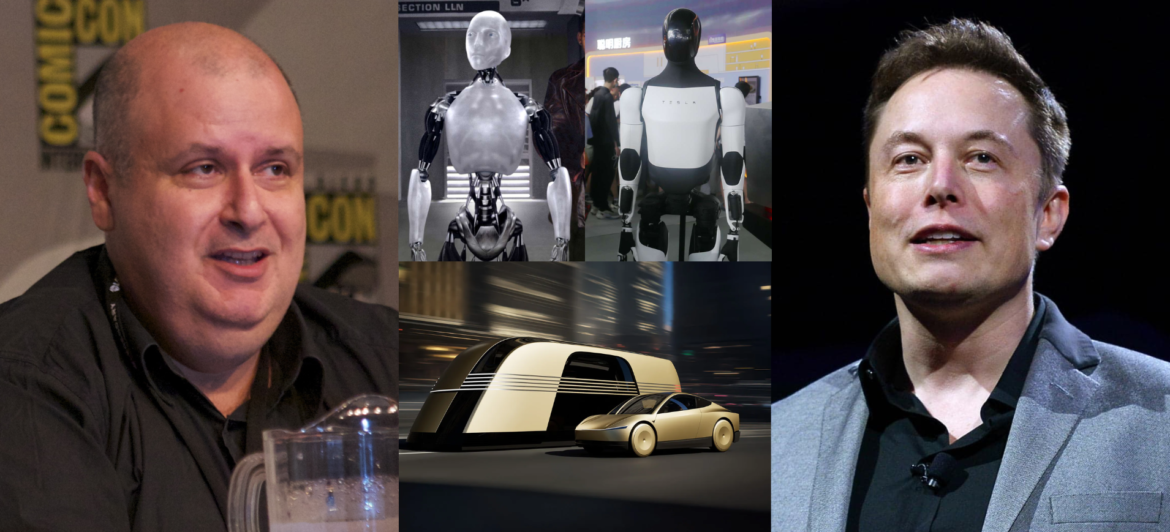Hollywood director Alex Proyas, known for the 2004 sci-fi film I, Robot, has accused billionaire entrepreneur Elon Musk of copying the film’s designs for Tesla’s recent innovations in humanoid robots and futuristic vehicles. The accusation came after Musk showcased Tesla’s latest developments at a “We, Robot” event, which prominently featured the Optimus robot and the Cybercab, a driverless vehicle with winged doors.
Accusations of Design Similarities
The I, Robot director took to X (formerly Twitter) to voice his concerns, claiming that Musk had borrowed heavily from his film’s iconic visuals. In a post viewed over 6 million times, Proyas wrote, “Hey Elon, can I have my designs back please,” alluding to the striking resemblance between the futuristic machines in his movie and Tesla’s newest creations. The film, which stars Will Smith as a detective skeptical of obedient androids, featured a world where humanoid robots play a prominent role in society—an eerie parallel to Musk’s presentation.
Proyas did not stop there. Responding to an Instagram post questioning the originality of his own work, the Australian filmmaker defended his team’s creativity. He also took a swipe at Musk’s design team, saying, “Elon Musk on the other hand has a not-so-talented design team who watched a lot of movies, including I, Robot it seems.”
Comparison to Tesla’s Unveiling
At Tesla’s We, Robot event, Musk unveiled his vision for the future of transportation and robotics. One of the key highlights was Tesla’s Cybercab, a sleek vehicle without a steering wheel or pedals, designed for a fully autonomous future. Additionally, the showcase featured Tesla’s Optimus robot, a humanoid machine intended to revolutionize automation and human-robot interactions. The event’s title itself appeared to be a play on I, Robot, which was inspired by a collection of short stories by Isaac Asimov.
Patrick Tatopoulos, the production designer for I, Robot, also weighed in on the controversy by posting a side-by-side comparison of the film’s designs and Tesla’s creations on Instagram. “Maybe it is just me, or should I feel honoured that Elon found some inspiration in my I, Robot designs,” Tatopoulos wrote, adding that it was “fun to watch” the parallels.
Mixed Reactions Online
The accusations from Proyas sparked debate on social media, with some supporting the director’s claims and others dismissing them. Critics of Proyas pointed out that I, Robot itself was influenced by earlier works in the sci-fi genre. Several users replied to Proyas’ post with images of Metropolis, the classic 1927 German expressionist film by Fritz Lang, which also featured humanoid robots, suggesting that sci-fi concepts often build upon one another.
Some observers noted that Musk has a long history of drawing inspiration from science fiction. Musk himself has acknowledged being influenced by Douglas Adams’ The Hitchhiker’s Guide to the Galaxy, particularly the character of Marvin the Paranoid Android. In fact, Musk’s AI chatbot, Grok, designed for X, was modeled after the sarcastic android from Adams’ work.
Similarly, Musk has often referenced popular sci-fi films when discussing his products. He once called Tesla’s Cybertruck “an armored personnel carrier from the future” and mentioned that it was something that “Blade Runner would have driven.” This tendency to draw from sci-fi for technological inspiration has made Musk a target of both admiration and criticism.
Sci-Fi and Tech Industry Overlaps
This is not the first time technology companies have faced allegations of borrowing from science fiction. OpenAI CEO Sam Altman recently addressed comparisons between ChatGPT’s new voice and the virtual assistant voiced by Scarlett Johansson in the 2013 film Her. Following criticism over its similarity, OpenAI removed the voice, with Altman stating that it was not intended to be an imitation. Johansson herself expressed anger and shock at the resemblance.
With technological advancements like generative AI, humanoid robots, and futuristic vehicles becoming increasingly prevalent, the line between sci-fi imagination and real-world innovation continues to blur. As companies like Tesla push the boundaries of technology, accusations of borrowing from sci-fi films and literature are likely to persist.
The Future of Innovation
As Hollywood director accused Elon Musk for copying his work, the debate highlights the intricate relationship between science fiction and technological progress. Whether Tesla’s designs were directly inspired by I, Robot remains a matter of speculation, but the incident underscores how sci-fi continues to influence real-world innovations. For now, the public can only watch as these futuristic concepts transition from screen to reality, sparking further conversations about originality and creativity in the tech industry.
Stay connected to know more on arcnews.online for global news like Hollywood Director Accused Elon Musk For Copying His Work. For videos updates visit our YouTube. Do subscribe to Arcnews to get latest updates directly in your mail box.
Have A Great Day.


